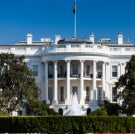A number of Democrats now think President Joe Biden will bow out of the 2024 election race, possibly as soon as this weekend, according to a report.
Biden, who tested positive for Covid-19 on Wednesday, is self-isolating at his beach house in Rehoboth, Delaware.
While he remains publicly committed to staying in the race, Axios reports that in private, the president has resigned himself to increasing pressure from lawmakers calling on him to drop out amid bad polling and mounting scrutiny of his age and mental acuity.
Party leaders, donors, and some close friends don’t think he can defeat Donald Trump in November and that he’s unable to change the public view of his age. There’s also fears that he’ll drag down Democrats’ efforts to keep the Senate and win back the House.
It was reported on Thursday that former president Barack Obama has also questioned the viability of the Biden campaign. He has taken calls from other concerned Democrats, such as former House Speaker Nancy Pelosi.
But the Biden campaign has said that the president remains committed to running, and winning, in November.
This all comes after his disastrous debate on June 27 when Biden appeared confused and frail, made several gaffes, and lost his train of thought.
Insiders have previously told The Independent that they believe there is “no question” Vice President Kamala Harris would receive the baton if Biden chose not to run in November. However, to date, Harris has remained steadfastly loyal to Biden’s bid.
But how would replacing Biden actually work? Here’s the process as calls grow for him to pass the torch:
The clock is ticking
The clock is ticking for Biden to step aside. The party’s nominee will be officially chosen at the Democratic National Convention in Chicago between 19 and 22 August.
Almost all of the nearly 4,000 Democratic delegates are currently pledged to Biden after he swept the primary races.
But during a press conference earlier this month, Biden said of the delegates: “They’re free to do whatever they want.”
“Tomorrow, if all of a sudden I show up at the convention and everyone says we want someone else, that’s the democratic process. It’s not going to happen.”
But it’s a bit more complicated than that. During the roll call vote to officially select the nominee, delegates who choose not to back the acknowledged candidate would have to vote “present” rather than vote for a different candidate.
Biden is for now the sole acknowledged candidate and so will likely stay as the nominee unless he chooses to step aside.
If he does step aside, it would make it easier for the delegates to vote for someone else.
Brookings senior fellow Elaine Kamarck told CNN that the rule for electing nominees, in place since the 1984 convention, states that delegates should “in all good conscience vote for the person they were selected to represent.”
But she added: “It’s never been tested. There’s no legal history on what ‘in all good conscience’ means … We’ve never had a convention where a lot of people voted against the person that they got elected with.”
If Biden steps aside
If Biden decides to step aside, Democrats will have to pick a new presidential nominee. And the logistics surrounding that are not simple.
The modern primary campaigning and nominating process began in earnest during John F Kennedy’s 1960 run for president. Before that, nominating a candidate bore more resemblance to proverbial smoke-filled rooms where party elders selected the nominee away from the eyes and ears of the public.
That’s infeasible at this moment, particularly for a party that bills itself as a defender of democracy.
At the same time, Democrats would risk a battle royale if too many candidates were to emerge in the race.
Should Biden stand down, the process would have to be carefully handled to make sure this didn’t scupper the party’s chances against Donald Trump in November.
‘A process that is open, transparent, and energizing’
Enter James Zogby, member of the Democratic National Committee, who worked on Jesse Jackson’s campaigns and whom Bernie Sanders nominated to serve on the party platform committee in 2016.
Zogby recently sent a memo, seen by The Independent, to DNC Chairman Jaime Harrison laying out how to replace Biden in the event that he does step down.
“The central idea is to create a process that is open, transparent, and energizing, while, at the same time, legitimate and democratic,” the memo reads. “And it is one that is deeply respectful of the president and his accomplishments.”
The plan would require that any prospective candidate secure the endorsement of 40 committee members — since most members are elected officials — and that they must include four members from each region.
After the deadline, candidates would appear during televised events to make their case to voters. That would culminate in a nominating process at the Democratic National Convention in August.
“It is not a coronation,” the memo says. “…For at least one month, national media will be focused on our candidates and our exciting process, drawing sharp contrast with the antics of GOP nominee. Given that we can likely predict the pool of potential candidates (Vice President Harris, Governors, Senators, Members of Congress) — the debate they will have will no doubt be respectful and substantive.”
Zogby’s proposal is an audacious one. It would require TV networks to comply and broadcast the debate. And despite his optimism, there is no guarantee that the contest for delegates would be a clean fight.
Indeed, the old ways were rife with kickbacks, corruption, and back-scratching. And Republicans would make hay of the disarray that Democrats face.
But it might be one of the few options the party has. In 2020, Democratic primary voters chose Biden almost as soon as he won in South Carolina, and then, as a way to prohibit a challenger, the party moved the state up the calendar in 2024. Democrats ostracized heretics like Representative Dean Phillips who suggested something different, even if he was an admittedly imperfect messenger for his cause.
If Biden does exit the stage, many Democrats might want to take a look at Zogby’s proposal.
The president has tried to explain away his debate performance with a variety of excuses. He previously suggested that he was exhausted at the debate due to jet lag. He told donors that “I decided to travel around the world a couple of times,” before taking the stage, adding: “I didn’t listen to my staff” and “I almost fell asleep onstage.” He then apologized for the faltering performance that sent Democrats into crisis.
But this excuse seems to be — to borrow a favorite word of the president — malarkey. Biden spent the better part of a week preparing for the debate. He went to Camp David to workshop his responses. Indeed, Republicans complained that Biden had spent his time cloistered to prepare instead of holding rallies as Trump did.
A question of cash
If Biden were to step aside, there are a number of reasons that party leaders think Harris would be handed the nomination – one of them being the campaign cash.
Biden and Harris have raised hundreds of millions of dollars over the last couple of years. The money has been divided between the Democratic National Committee, the Biden campaign, almost all state Democratic parties, as well as a number of joint fundraising committees that send cash around all those groups.
Those entities had collectively about $240m in cash in hand as of June 30. While most of the funds, such as those controlled by the Democratic National Committee, wouldn’t be affected by changing the top of the ticket, the most valuable cash is held by the Biden-Harris campaign committee, which had a $91m war chest as of May 30. Those funds have been raised by, and belong to, the Biden-Harris ticket, and which follow those two candidates.
If Biden steps aside and Harris takes the mantle, she would be able to access those funds.
However, if Biden steps aside and Harris isn’t chosen as the party’s nominee, the funds would have to be refunded or, as is more likely, transferred to a federal Super PAC. But those funds would then no longer be directly controlled by the campaign.
Source: independent.co.uk



